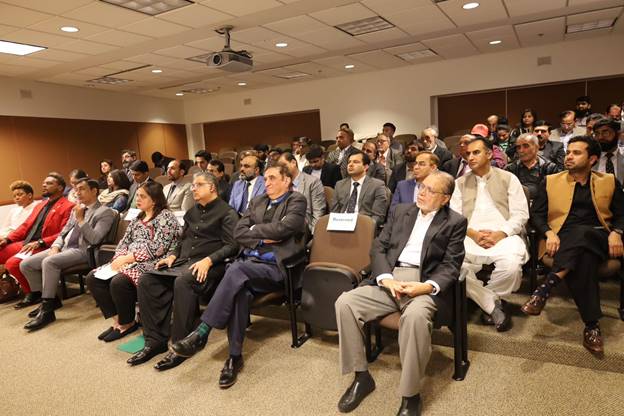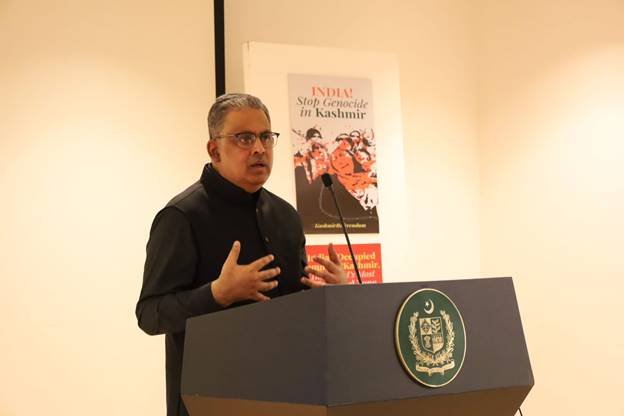


“History is on our side,” Ambassador Rizwan Saeed Sheikh said. “The historical record is an asset to us, and it needs to be referenced and upheld. Our job is to keep the flame alive, not to yield under the weight of global politics or economics.”
Kashmir and Palestine Have a Common Genesis:
Ambassador Rizwan Saeed Sheikh
By Elaine Pasquini

Washington: Kashmiri leaders, activists, and members of the Pakistani diaspora assembled at the Embassy of Pakistan in Washington, DC, on October 27, 2024, for the 77th observance of “Kashmir Black Day.” On that date in 1947, after India and Pakistan gained independence following nearly 90 years of British colonial occupation, Indian troops illegally entered Srinagar, Kashmir’s largest city, killing thousands in their effort to occupy the region.
As the Palestinians in Gaza and the West Bank have been illegally occupied by the State of Israel since 1948, “the issues of Kashmir and Palestine have a common genesis,” Ambassador Rizwan Saeed Sheikh, Pakistan’s Ambassador to the United States, pointed out to the large gathering, “it is important for both the issues to be taken together, as they will reinforce each other.”
Looking towards the US election on November 5, the ambassador noted “there is a lot of expectation that the ongoing brutalities in Gaza and the occupied Palestinian territories will move toward a solution. We believe this will happen.” And, at that time, it would “be an opportunity to raise greater awareness about the Kashmiri issue and the need to address it.”
Surrounded by a photographic exhibition highlighting Indian atrocities and the ground situation in occupied Jammu and Kashmir, messages from Pakistan’s leading governmental officials in Islamabad were read to the attendees.
In his message, Pakistani Prime Minister Muhammad Shehbaz Sharif reaffirmed Pakistan’s “unwavering moral, diplomatic and political support to the Kashmiri people’s struggle for realization of their right to self-determination, as enshrined in relevant UN Security Council Resolutions.”
Pakistani President Asif Ali Zardari also noted that the “United Nations Security Council has repeatedly affirmed the right of the Kashmiri people to self-determination through a fair and impartial plebiscite. Yet, India continues to defy these resolutions and deny Kashmiris their fundamental rights. Since August 5, 2019, India has further escalated its occupation by stripping IOJK of its special status and implementing measures to alter its demographic and political landscape.”
In his message, Deputy Prime Minister/Foreign Minister Muhammad Ishaq Dar stated: “Pakistan stands in unwavering solidarity with the Kashmiri people in their struggle and will continue to provide its full political, moral and diplomatic support to the realization of their inalienable right to self-determination.”
Recalling various UN resolutions on the issue of Kashmir, Ambassador Sheikh highlighted United Nations Security Council Resolution 122, adopted on January 24, 1957, which barred the parties from taking any unilateral action other than the prescribed solution of a UN-supervised plebiscite.
“History is on our side,” the ambassador said. “The historical record is an asset to us, and it needs to be referenced and upheld. Our job is to keep the flame alive, not to yield under the weight of global politics or economics.” Since August 5, 2019, the Kashmir issue has “increasingly become a legal battle,” he added. “The case is in our favor. It’s only a matter of the right timing in international politics and economics.”
Reiterating the need for unity, Ambassador Sheikh emphasized the importance of a coalition of relevant people in key global capitals to ensure that their pronouncements are legally cogent and coherent.
He also called upon the international community and human rights organizations to play their role in not only highlighting the plight of Kashmiris but also facilitating a solution to the long-standing issue.
Several community leaders spoke at the program, including Dr Ghulam Nabi Fai, secretary general of the World Kashmir Awareness Forum, who appealed to world powers for a comprehensive and lasting peace in South Asia and for a politically secure and democratic future with the right to self-determination for the people of Jammu and Kashmir. “There must be an early, just and durable resolution to the Kashmir dispute in accordance with the international agreements and wishes and aspirations of the people,” he said.
Professor Imtiaz Khan of George Washington University, Ilyas Masih of All Neighbors International, Pastor William Archer and former ICNA President Zahid Bukhari, also addressed attendees at the program highlighting the Kashmiris' legitimate struggle for self-determination.
Video messages from Pakistani Senator Mushahid Hussain Syed, Oussama Jammal, Secretary General of the US Council of Muslim Organizations (UCMO), and Farhan Chak, Secretary-General of the Canadian-based NGO Kashmir Civitas, along with a special documentary on the struggle of the Kashmiri people, were also presented.
In closing, Ambassador Sheikh thanked the participants for their commitment and expression of solidarity with the people of Jammu and Kashmir, telling them: “Our job is to maintain unity and to keep the flame alive.”
(Elaine Pasquini is a freelance journalist. Her reports appear in the Washington Report on Middle East Affairs and Nuze.Ink.)

